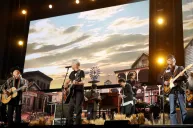Hit songwriter Shane McAnally has teamed up with artist manager Jason Owen to form a new iteration of Monument Records. Among the new label's initial signings is buzzy country songstress Caitlyn Smith and Walker Hayes.
Videos by Wide Open Country
If you recall, Monument Records originally belonged to Fred Foster. Founded in 1958 in Washington D.C., the label made a habit out of signing artists nobody else would. Eventually moving to Nashville, Monument housed icons such as Roy Orbison, Kris Kristofferson, Willie Nelson and Dolly Parton.
Foster signed artists nobody else would. He found talented songwriters like Kristofferson and Nelson who wanted to be artists but had doors slammed in their faces. Then, he gave them the shot.
The original Monument Records closed in 1990. And though the new one doesn't legally share history with the old, it does share philosophy.
"We are looking for very specific artists," Owen says. "Ones who are genreless and are superstars. Ones who connect, aren't fluff and aren't forgettable. That's the stuff we're going to sign: something where everyone goes, 'We love this, but don't know what to do with this.'"
"We do," he adds.
In other words, they're following Foster's footsteps. After the Monument name cleared, the pair knew it was right. "It represented the best of music, not genres," Owen says. "And it stands for something that's going to last for ages, not just the latest trend or moment, which is what Shane and I are working to create with this label's artists and music."
Man, it's nice to hear that kind of language coming out of Music Row. Owen's firm Sandbox Management deals with some of the industry's biggest names. They manage artists like Little Big Town and Faith Hill.
Meanwhile, Shane McAnally appears up and down the Billboard charts as a mega-successful writer and producer. He helped shape sounds of artists from Kacey Musgraves to Sam Hunt.
"I've always believed an artist that doesn't 'fit' anywhere actually fits everywhere," McAnally says. "We won't be limited by perceived genres. We will make music, then let it find its home — because I find that accommodating a particular genre can water down the process of an artist's evolution."




